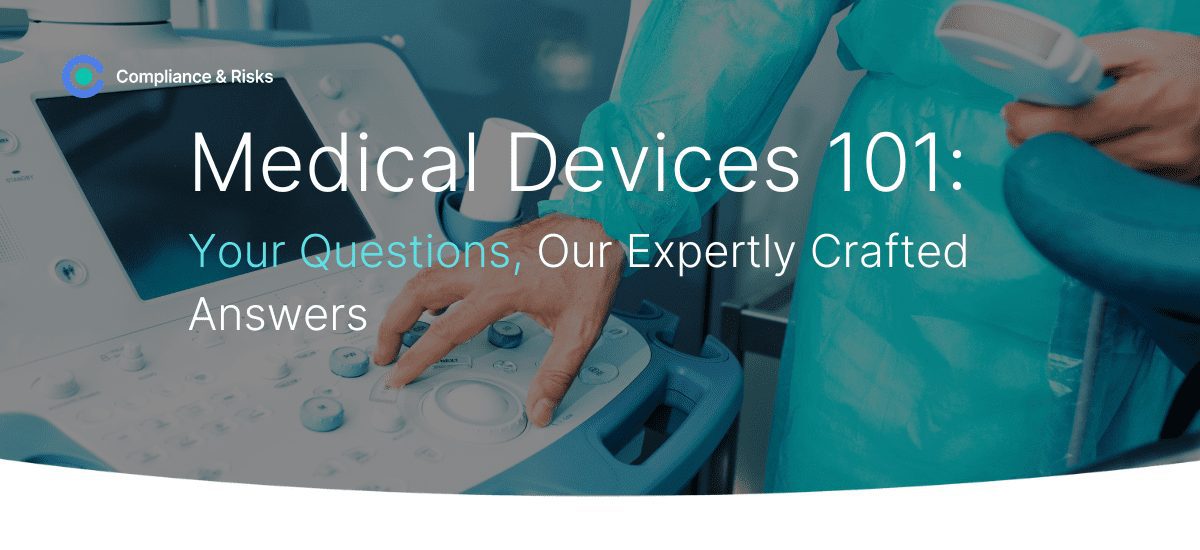
Medical Devices 101 | Your Questions | January 2024

Medical devices face a unique regulatory landscape that has been increasingly complicated by several factors in recent years.
The demand for more sustainable technology is being driven by both consumer demand and legislators, leading to regulatory implications. Global events such as Brexit and COVID-19 have also created unprecedented challenges.
As devices become increasingly integrated with artificial intelligence and an internet connection, new cybersecurity and data protection legislation is racing to keep up.
And on top of all this, the new regulatory framework for IVDR and proposed amendments for the registration, and inspection of medical devices under MDR means staying ahead is more critical than ever.
In this series, we gather some of the most interesting recent inquiries from Compliance & Risks customers regarding medical device regulatory updates globally.
Question 1: Please provide information on monitoring and control instruments and medical devices and the Saudi Arabia Regulation on Restriction on the Use of Hazardous Substances in Electrical and Electronic Equipment?
Saudi Arabia’s RoHS Regulation on restriction on the use of hazardous substances in electrical and electronic equipment (RoHS) restricts the use of certain hazardous substances in electrical and electronic equipment and its transitional period for monitoring and control instruments ended on 26 December 2023.
Similar to EU RoHS, Saudi Arabia’s RoHS provides for exemptions specific to monitoring and control equipment, including equipment designed for industrial or professional use.
Medical devices are exempt from the Saudi RoHS regulation. For monitoring & control devices, the manufacturer or importer must organize the testing and certification process with a notified body. Article 5 states that the supplier responsible for placing electrical and electronic devices and equipment on the market must obtain a conformity certificate (Type 1a) in accordance with the specifications of ISO/IEC 17067 from an accredited Conformity Assessment Body (CB).
Question 2: Is Packaging in scope of the USA Toxic Substances Control Act (TSCA) reporting and what are the exemptions?
Regarding the USA Toxic Substances Control Act (TSCA) rule on Reporting and Recordkeeping Requirements for PFAS, there is no direct requirement referring to packaging or any other product or “article”. The rule appears to be broadly concerned with ‘manufacture’, and it appears to apply to what may be virtually any product containing PFAS.
Exemptions include; pesticides, food, drugs, tobacco, cosmetics, and medical devices, which are under the FDA, and municipal solid waste importers. The rule requires reporting of “manufacturing” of PFAS, and if a company (or person) manufactured PFAS and if PFAS is in an article that the company manufactured or imported, in any amount, the company would be subject to the reporting rule regardless of the article.
Question 3: Are medical devices & medicines in scope of Oregon (USA): Packaging Producer Responsibility for Recycling, Senate Bill 582 Enacted, 2021?
Oregon (USA): Packaging Producer Responsibility for Recycling, Senate Bill 582 Enacted, 2021 provides the following exemptions for medicines;
Packaging and paper products sold or supplied in connection with:
- (i) Prescription drugs as defined in ORS 689.005;
- (ii) Nonprescription drugs as defined in ORS 689.005;
- (iii) Drugs marketed under a brand name as defined in ORS 689.515; or
- (iv) Drugs marketed under a generic name as defined in ORS 689.515.
(N) Packaging and paper products sold or supplied in connection with drugs that are used for animal medicines, including but not limited to parasiticide drugs for animals.
(O) Packaging and paper products sold or supplied in connection with:
- (i) Infant formula as defined in 21 U.S.C. 321(z);
- (ii) Medical food as defined in 21 U.S.C. 360ee(b)(3).
Stay Compliant With Global Medical Device Regulations:
Catch up on our medical device updates with your coffee here:
- Software As A Medical Device – Definition and Classification in the EU, USA, China, and Japan
- Regulatory Trends in Medical Devices: A 12-18 Month Outlook
- Keeping Pace with Change: Recent Regulatory Updates Shaping Medical Device Compliance
- European Commission Publishes MDR and IVDR Factsheet for Non-EU/EEA Countries
Have you got a Medical Device related query?
Many of the above questions were submitted and answers were conveyed by Compliance & Risks customers via the “Ask Our Experts” button in C2P.
Clients use AOE to ask about the latest proposed, enacted, and amended regulations and mandatory standards applicable to their products and geographies of interest.
When AOE questions can be answered in 30 minutes or less, Compliance & Risks’ subject matter experts answer them at no charge!
To learn more about C2P and how Compliance & Risks SMEs can help you with your questions, contact us today.
Meet our Experts

Global Regulatory Compliance Team
Our team of experts will elevate your strategic edge by addressing questions about laws and regulations. Fluent in almost 30 languages and backed by an extensive database of 82,000 sources, our experts bring unparalleled knowledge to the table. Moreover, our expert team is dedicated to educating your organization, fostering better engagement, and ensuring your compliance and risk management strategies are second to none. With our team of seasoned professionals by your side, you’ll gain a competitive edge in navigating the complex landscape of compliance management, gaining deeper insights and valuable guidance.


